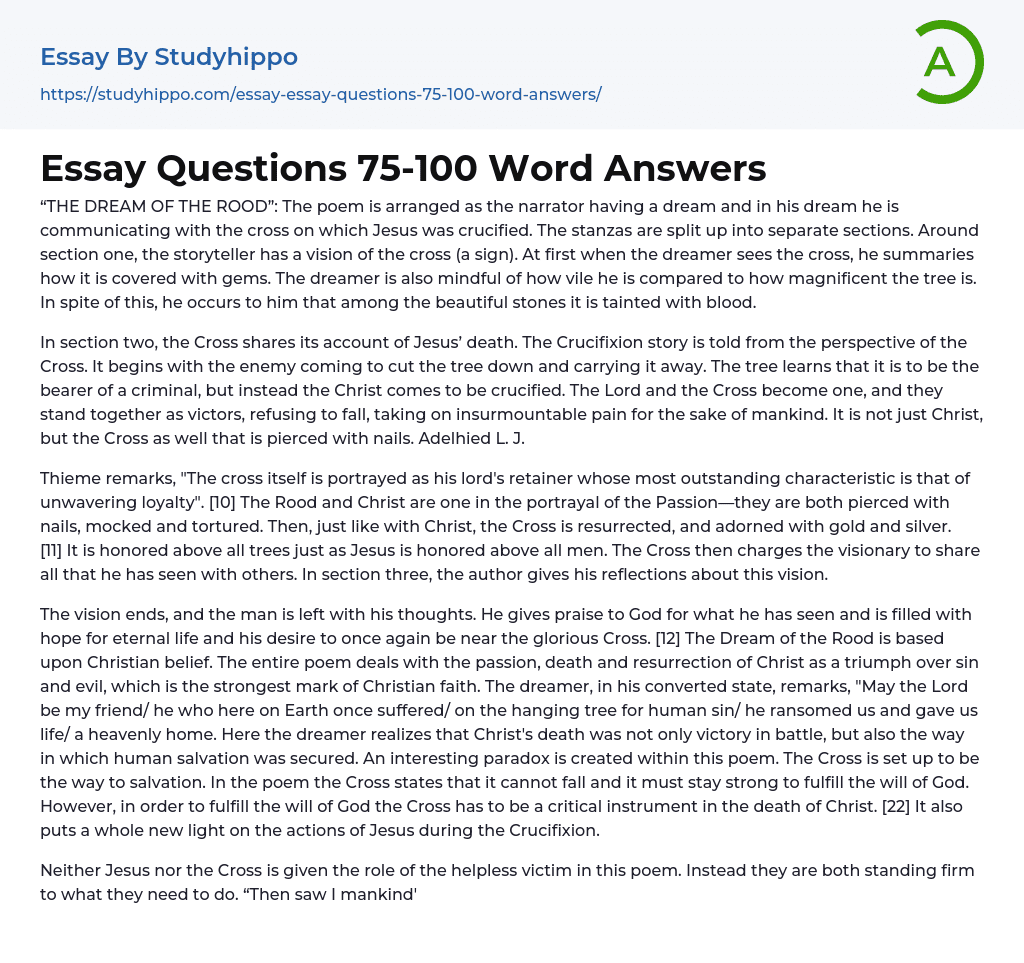"THE DREAM OF THE ROOD": The poem's structure consists of the narrator dreaming and engaging with the cross that Jesus was crucified on.
The poem's stanzas are divided into different parts. In the first section, the narrator has a vision of a cross, symbolizing a sign. Initially, the dreamer describes the cross as adorned with precious gems. However, the dreamer is aware of his own unworthiness compared to the magnificence of the tree. Nevertheless, he realizes that amidst the beautiful stones, the cross is stained with blood. In the second section, the Cross itself recounts Jesus' crucifixion.
The Crucifixion narrative is portrayed through the viewpoint of the Cross. Initially, the tree faces the threat of being chopped down and taken away by the enemy. However, instead of a criminal, it discovers that it will bear the weight of Christ
...'s crucifixion. In this merging, the Lord and the Cross become united, standing resolute as champions and enduring immense agony for humanity's sake. Both Christ and the Cross are subjected to the piercing of nails. - Adelhied L.
J. Thieme describes the cross as representing unwavering loyalty to the Lord. Both the Cross and Christ are depicted as being pierced with nails, mocked, and tortured during the Passion. Similar to Christ, the Cross is resurrected and embellished with gold and silver. It is revered above all trees, just as Jesus is revered above all men. The visionary is then instructed by the Cross to share everything they have witnessed with others.
Section three of the text encompasses the author's reflections on the vision he has just experienced. As the vision concludes, the man is left alone with his thoughts, expressing his
gratitude to God for what he has witnessed. He feels filled with hope for everlasting life and is eager to be reunited with the magnificent Cross once more. [12] It is important to note that The Dream of the Rood is rooted in Christian doctrine.
The poem focuses on the passion, death, and resurrection of Christ as a triumph over sin and evil, reflecting the essence of Christian faith. In his transformed state, the dreamer acknowledges, "May the Lord be my friend/ he who suffered on Earth/ on the cross for mankind's sins/ he redeemed us and granted us life/ an abode in heaven." Here, the dreamer recognizes that Christ's death was not merely a victorious battle but also the means through which human salvation was attained. This poem presents an intriguing paradox.
The poem presents the Cross as the means of attaining salvation, highlighting its unwavering nature and underscoring the significance of remaining steadfast to fulfill God's plan. However, for God's will to be accomplished, the Cross must play a vital part in Christ's death. This perspective also offers a new understanding of Jesus' actions during the Crucifixion, depicting neither him nor the Cross as helpless victims. Instead, both firmly adhere to their respective roles.
In line 33b-34b of the text, it is stated that I witnessed the arrival of mankind's Lord with great bravery when he intended to ascend upon me. This portrays Jesus as a powerful conqueror. It is also mentioned that he is depicted as a gallant German lord who sacrifices himself to save his troops [23]. Jesus does not simply accept his fate of being crucified; instead, he fully embraces the Cross and
takes upon himself the burden of all humanity's sins. Please note that in order to improve the clarity, I have edited the paragraphs and included specific names and descriptions of Christ.
- Spirituality essays
- Angel essays
- Adam And Eve essays
- Baptism essays
- Catholic Church essays
- Christian essays
- Church essays
- Crucifixion Of Jesus essays
- Crusades essays
- Elizabeth essays
- Eucharist essays
- God The Father essays
- Holy Spirit essays
- Jesus Christ essays
- Lord essays
- Pope essays
- Priest essays
- Protestant Reformation essays
- Protestantism essays
- Sacrament essays
- Afterlife essays
- Atheism essays
- Bible essays
- Buddhism essays
- Christian Worldview essays
- Christianity essays
- Confession essays
- Cosmological Argument essays
- Deism essays
- Devil essays
- Existence of God essays
- Faith essays
- Freedom Of Religion essays
- God essays
- Hinduism essays
- Immortality essays
- Islam essays
- Jainism essays
- Jews essays
- Judaism essays
- Miracle essays
- Monk essays
- Monotheism essays
- New Testament essays
- Old Testament essays
- Pilgrimage essays
- Puritans essays
- Revelation essays
- Ritual essays
- Salvation essays




